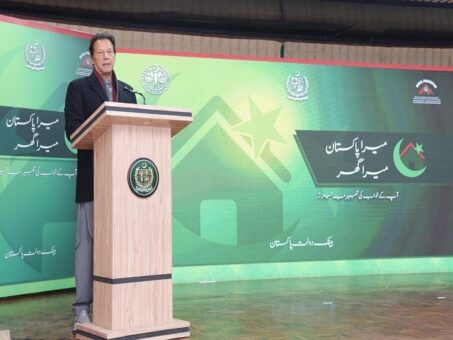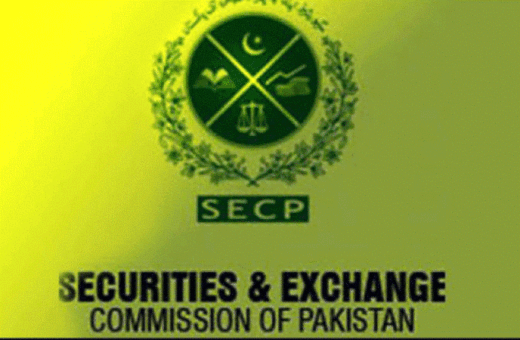KARACHI: Bank Alfalah has secured the top position in house financing under the government’s flagship Mera Pakistan Mera Ghar (MPMG).
According to a statement issued by the State Bank of Pakistan (SBP), Bank Alfalah secured the top position followed by Meezan Bank Limited and Standard Chartered Bank Limited.
A ceremony was held on Friday at Prime Minister House, Islamabad to mark Rs 100 billion in home finance approvals of the Governments flagship Mera Pakistan Mera Ghar (MPMG) program under the theme “ Khawab ke tabeer ab tez ter”.
READ MORE: Financing for Mera Pakistan Mera Ghar gains momentum
The Prime Minister lauded the leading role of the State Bank of Pakistan and the efforts of the banking industry in the implementation of MPMG. He also witnessed ceremonial keys being handed over to six beneficiaries of MPMG who were from different regions and represented a variety of segments of Pakistan.
Over 20 other beneficiaries of MPMG also participated in the ceremony. The Prime Minister expressed his pleasure to see that low and middle-income citizens who were completely ignored earlier are now being served by the banks in obtaining home finance. While distributing awards among top-performing banks with respect to approvals and disbursements, he urged banks to accelerate their efforts to help realize the dream of every Pakistani to own their own homes.
The ceremony was attended by Ali Amin Gandhapur-Federal Minister for Kashmir Affairs & Gilgit Baltistan, Dr. Shahbaz Gill-Special Assistant to Prime Minister on Political Communication, Senator Shaukuat Tareen-Adviser to Prime Minister on Finance & Revenue, Governor State Bank of Pakistan, Chairman NAPHDA, Dr. Amjad Ali-Minister for Housing Khyber Pakhtunkhwa and Presidents/CEOs of banks.
READ MORE: SBP launches webpage for promoting house financing
Dr. Reza Baqir, Governor State Bank of Pakistan, shared the progress of MPMG since inception, highlighting that all stakeholders are taking steps in the right direction to translate the Prime Minister’s vision of increasing homeownership into reality. Till December 20, 2021, banks have received applications of Rs. 263 billion while approvals of Rs. 109 billion have already been made. Over the last nine months, the approved amount increased by Rs. 98 billion. Disbursement has also increased from almost zero in March 2021 to Rs. 32 billion by December 20, 2021. While shedding light on the theme of the event, he mentioned that during the last month, banks on average approved Rs. 4 billion and disbursed Rs. 1.6 billion on weekly basis. He underscored the need to maintain and accelerate this momentum. There are six banks that disbursed over Rs. 2 billion each and seven banks have disbursed over Rs. 1 billion each in the span of 9 months under MPMG.
The Governor said that growth in MPMG is attributed to various measures taken by the Government, SBP, and NAPHDA to provide a conducive environment for the banking industry to enter the untapped market of housing and construction finance. He mentioned the simplification of complex procedures, a significant reduction in documentation requirement, development of a model to assess informal income, effective redressal mechanism as examples of this support. Communication initiatives like Mera Pakistan Mera Ghar Meri Kahani –a series of testimonials of MPMG beneficiaries have also been instrumental in encouraging others to apply.
READ MORE: PM launches house financing scheme for NRPs
Earlier, in a meeting of the National Coordination Committee on Housing, Construction, and Development (NCCHCD), Governor SBP apprised the Prime Minister on developments in housing and construction finance. He recalled that in July 2020, in line with the Government’s vision of boosting economic activity, SBP mandated banks to increase their housing and construction finance to at least 5 percent of their domestic private sector advances by December 31, 2021. Five banks have already achieved their December 2021 targets. The best performing banks in this regard were Albaraka Bank followed by Meezan Bank and Dubai Islamic Bank. He highlighted that as of December 17, 2021, banks have lent Rs. 321 billion which is Rs. 173 billion more than their financing as of June 30, 2020, reflecting a growth of 117 percent since June 2020. He praised Bank Al Habib, National Bank, and Bank Alfalah for a significant increase in their housing and construction finance portfolio since June 2020 till date.
In conclusion, Governor Baqir expressed SBPs confidence that the banking industry will continue to pace up its performance rapidly to meet the objectives of Mera Pakistan Mera Ghar and to reach targets mandated for Housing and Construction Finance.
READ MORE: Meezan Bank becomes pioneer in Sharia financing for low cost housing
The MPMG event also witnessed speeches from Senator Shaukat Tareen, Adviser to Prime Minister on Finance & Revenue, and Lt Gen Anwar Ali Hyder, Chairman NAPHDA. The Finance Adviser reiterated the Government commitment to MPMG and assured banks to provide all needed support. Chairman NAPHA requested banks to demonstrate commitment in providing housing finance to individuals in NAPHDAs LDA City and Peri Urban projects.




